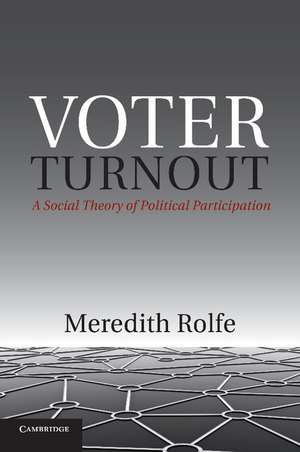Voter Turnout: A Social Theory of Political Participation: Political Economy of Institutions and Decisions
Autor Meredith Rolfeen Limba Engleză Paperback – 21 aug 2013
| Toate formatele și edițiile | Preț | Express |
|---|---|---|
| Paperback (1) | 203.67 lei 6-8 săpt. | |
| Cambridge University Press – 21 aug 2013 | 203.67 lei 6-8 săpt. | |
| Hardback (1) | 682.42 lei 6-8 săpt. | |
| Cambridge University Press – 12 feb 2012 | 682.42 lei 6-8 săpt. |
Din seria Political Economy of Institutions and Decisions
-
 Preț: 133.60 lei
Preț: 133.60 lei -
 Preț: 208.93 lei
Preț: 208.93 lei -
 Preț: 235.99 lei
Preț: 235.99 lei -
 Preț: 200.85 lei
Preț: 200.85 lei -
 Preț: 211.84 lei
Preț: 211.84 lei -
 Preț: 231.82 lei
Preț: 231.82 lei -
 Preț: 306.68 lei
Preț: 306.68 lei -
 Preț: 208.14 lei
Preț: 208.14 lei -
 Preț: 177.53 lei
Preț: 177.53 lei -
 Preț: 295.55 lei
Preț: 295.55 lei -
 Preț: 236.43 lei
Preț: 236.43 lei -
 Preț: 265.11 lei
Preț: 265.11 lei -
 Preț: 228.38 lei
Preț: 228.38 lei -
 Preț: 281.49 lei
Preț: 281.49 lei -
 Preț: 285.37 lei
Preț: 285.37 lei -
 Preț: 279.98 lei
Preț: 279.98 lei - 14%
 Preț: 773.75 lei
Preț: 773.75 lei -
 Preț: 233.38 lei
Preț: 233.38 lei -
 Preț: 247.41 lei
Preț: 247.41 lei -
 Preț: 203.12 lei
Preț: 203.12 lei -
 Preț: 230.33 lei
Preț: 230.33 lei -
 Preț: 286.69 lei
Preț: 286.69 lei - 14%
 Preț: 790.57 lei
Preț: 790.57 lei -
 Preț: 265.32 lei
Preț: 265.32 lei - 11%
 Preț: 554.15 lei
Preț: 554.15 lei -
 Preț: 287.07 lei
Preț: 287.07 lei - 11%
 Preț: 700.20 lei
Preț: 700.20 lei -
 Preț: 273.13 lei
Preț: 273.13 lei -
 Preț: 459.84 lei
Preț: 459.84 lei -
 Preț: 280.35 lei
Preț: 280.35 lei -
 Preț: 260.11 lei
Preț: 260.11 lei - 11%
 Preț: 640.30 lei
Preț: 640.30 lei -
 Preț: 286.89 lei
Preț: 286.89 lei -
 Preț: 247.80 lei
Preț: 247.80 lei - 11%
 Preț: 691.81 lei
Preț: 691.81 lei -
 Preț: 287.48 lei
Preț: 287.48 lei - 11%
 Preț: 641.80 lei
Preț: 641.80 lei - 11%
 Preț: 635.32 lei
Preț: 635.32 lei -
 Preț: 271.01 lei
Preț: 271.01 lei -
 Preț: 265.70 lei
Preț: 265.70 lei
Preț: 203.67 lei
Nou
Puncte Express: 306
Preț estimativ în valută:
38.98€ • 40.64$ • 32.39£
38.98€ • 40.64$ • 32.39£
Carte tipărită la comandă
Livrare economică 21 martie-04 aprilie
Preluare comenzi: 021 569.72.76
Specificații
ISBN-13: 9781107617988
ISBN-10: 1107617987
Pagini: 248
Ilustrații: 16 b/w illus. 4 maps 14 tables
Dimensiuni: 152 x 229 x 14 mm
Greutate: 0.37 kg
Editura: Cambridge University Press
Colecția Cambridge University Press
Seria Political Economy of Institutions and Decisions
Locul publicării:New York, United States
ISBN-10: 1107617987
Pagini: 248
Ilustrații: 16 b/w illus. 4 maps 14 tables
Dimensiuni: 152 x 229 x 14 mm
Greutate: 0.37 kg
Editura: Cambridge University Press
Colecția Cambridge University Press
Seria Political Economy of Institutions and Decisions
Locul publicării:New York, United States
Cuprins
1. Introduction; 2. Conditional choice; 3. The social meaning of voting; 4. Conditional cooperation; 5. Conditional voters; 6. The social theory of turnout; 7. Education and high salience elections; 8. Mobilization and turnout in low salience elections; 9. Paradox lost.
Recenzii
“In Voter Turnout, Meredith Rolfe presents a dramatically new and different account of one of the most studied of political behaviors, turnout. Her explanation is of turnout as a social act. She develops a rigorous theory what she calls conditional decision making, that is decision making that varies in precise ways when embedded in different networks. She is able to derive interesting implications of this theory and contrast it with the more usual account, what she would call unconditional decision making. And she is able to test this account, among other things providing a very different explanation of education and turnout. This is a theoretically innovative and rigorous explanation that all must take seriously.”—John Aldrich, Duke University
“Voter Turnout is an important book that brings a fresh perspective to the study of the most critical act of democratic participation. It will surely push political scientists to think about the act of voting in new ways.”—Adam J. Berinsky, Massachusetts Institute of Technology
“Rolfe has produced a fascinating account of the socially contingent basis for voter turnout. She joins a rich tradition, with roots that extend at least to the early 20th century work of Tingsten, demonstrating that the decision to vote is not simply an individualistic act, but rather a decision that is contingent on the behavior of others. Her argument treats turnout as a social dilemma in which individuals are more likely to participate if their associates participate. Thus the individual-level correlates of participation are, in fact, imperfect proxies for social structural variables – in particular, for the properties of the social networks within which individuals are located. Finally, and just as important, she convincingly demonstrates the relevance of social networks and social structure for alternative micro theories of individual behavior.”—Robert Huckfeldt, University of California, Davis
“This is an important book that reframes how social scientists should think about political choice. Rolfe offers a powerful new theoretical framework as well as compelling empirical results that reveal the extent to which political participation is imbedded in a dense web of social relationships. This book will set in motion of cottage industry of new research.”—Steven J. Rosenstone, Chancellor, Minnesota State Colleges and Universities
"Rolfe borrows the rigor of formal theory and applies it to an understanding of voters as socially embedded decision makers. This work is well grounded in two rich traditions and addresses social choice from economic and social perspectives. Summing Up: Recommended" -T. Marchant-Shapiro, Southern Connecticut State University, CHOICE Magazine
"Voter Turnout: A Social Theory of Political Participation is an excellent book. I strongly recommend it to anyone studying voter turnout or who is interested more generally in empirically oriented modeling or the role of social interactions in aggregate behavior. Meredith Rolfe lays out a social theory of voters turnout that at every step is justified by and challenges data, making it both an admirably coherent account of how social interactions affect aggregate turnout and a superb case study not only in detailing the empirical implications of theoretical models, but also the use of empirics to inform theoretical development." - David A. Siegel, Florida State University, The Journal of Politics
“Voter Turnout is an important book that brings a fresh perspective to the study of the most critical act of democratic participation. It will surely push political scientists to think about the act of voting in new ways.”—Adam J. Berinsky, Massachusetts Institute of Technology
“Rolfe has produced a fascinating account of the socially contingent basis for voter turnout. She joins a rich tradition, with roots that extend at least to the early 20th century work of Tingsten, demonstrating that the decision to vote is not simply an individualistic act, but rather a decision that is contingent on the behavior of others. Her argument treats turnout as a social dilemma in which individuals are more likely to participate if their associates participate. Thus the individual-level correlates of participation are, in fact, imperfect proxies for social structural variables – in particular, for the properties of the social networks within which individuals are located. Finally, and just as important, she convincingly demonstrates the relevance of social networks and social structure for alternative micro theories of individual behavior.”—Robert Huckfeldt, University of California, Davis
“This is an important book that reframes how social scientists should think about political choice. Rolfe offers a powerful new theoretical framework as well as compelling empirical results that reveal the extent to which political participation is imbedded in a dense web of social relationships. This book will set in motion of cottage industry of new research.”—Steven J. Rosenstone, Chancellor, Minnesota State Colleges and Universities
"Rolfe borrows the rigor of formal theory and applies it to an understanding of voters as socially embedded decision makers. This work is well grounded in two rich traditions and addresses social choice from economic and social perspectives. Summing Up: Recommended" -T. Marchant-Shapiro, Southern Connecticut State University, CHOICE Magazine
"Voter Turnout: A Social Theory of Political Participation is an excellent book. I strongly recommend it to anyone studying voter turnout or who is interested more generally in empirically oriented modeling or the role of social interactions in aggregate behavior. Meredith Rolfe lays out a social theory of voters turnout that at every step is justified by and challenges data, making it both an admirably coherent account of how social interactions affect aggregate turnout and a superb case study not only in detailing the empirical implications of theoretical models, but also the use of empirics to inform theoretical development." - David A. Siegel, Florida State University, The Journal of Politics
Notă biografică
Descriere
This book combines positive political theory, social network research and computational modeling, explaining why some people are more likely to vote than others.























